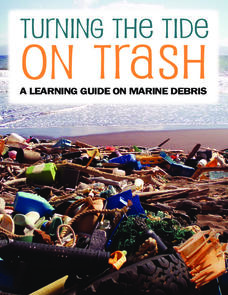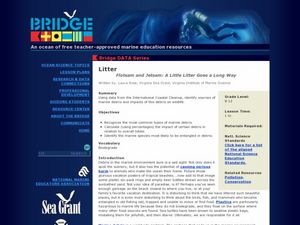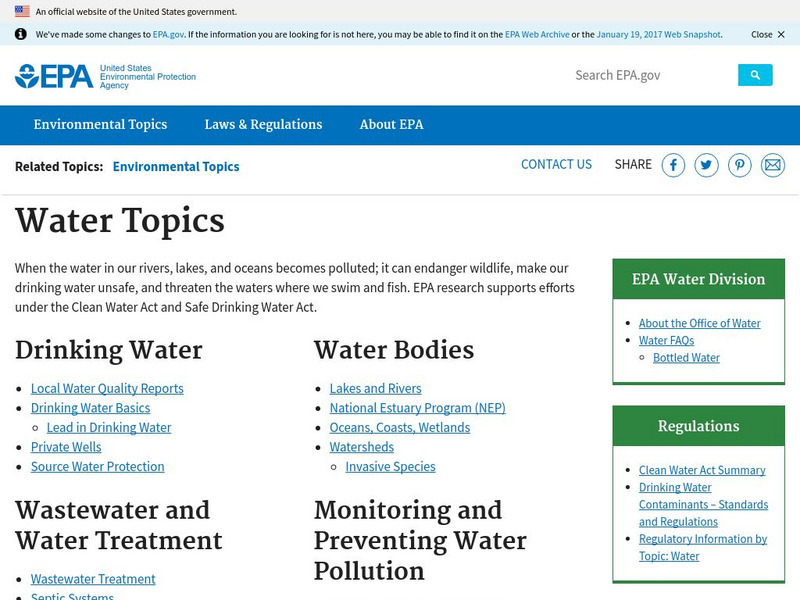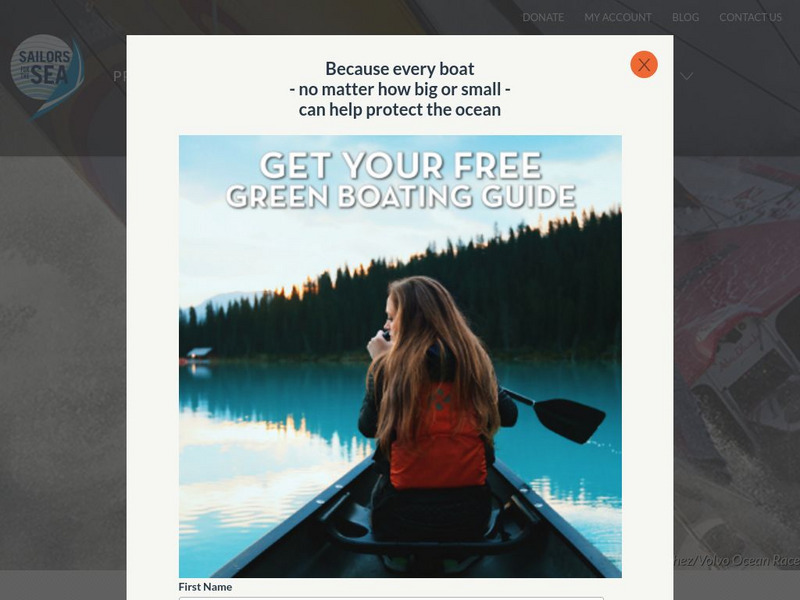NOAA
Turning the Tide on Trash: A Learning Guide on Marine Debris
The lessons in this learning guide are designed to increase youngsters' awareness of the impacts of marine debris and to teach them about pollution prevention techniques. This fabulous, 30-page packet is chock full of important...
Curated OER
Turning the Tide on Trash: Marine Debris Curriculum
Seven pages of fascinating reading on marine debris preface the activities in this lesson plan. Four different activities are employed to simulate how the debris is distributed in the ocean and along beaches. Early ecology learners...
National Wildlife Federation
Plastic in the Sea
How much plastic do people use? Class members identify how plastic is involved in their daily lives by looking at food packaging either at a grocery store or at home. Learners view statistics for the amount of plastics found on a beach...
Curated OER
Turning the Tide on Trash: Marine Debris Curriculum
Six different lessons comprise this unit on marine debris. Science, language arts, social studies, and art projects make this an ideal interdisciplinary unit. The result will be well-informed future citizens who can help make a...
Curated OER
Marine Debris
Now is the time to educate tomorrow's citizens to care for the planet, and here is a lesson to help facilitate the process. Collect some marine debris and bring it into class. Have your class separate it into types and then test each...
Curated OER
Marine Debris
Students perform experiments to examine if debris float, or blow in the wind. The effects of these characteristics on the marine debris are then discussed. They determine how a material can influence what becomes marine debris.
Curated OER
Beach Cleanup at a Local Beach
Students participate in an environmental clean-up activity. In this environmental lesson, students travel to a local beach. Working in small teams, students collect trash from the local beach. Returning to school, students sort the trash...
Curated OER
Types of Marine Debris
Students conduct an experiment. In this marine debris and environment protection activity, students categorize trash into piles, predict whether these trash items will sink, float or be picked up and carried by the wind and then...
Curated OER
Talking Trash - Marine Debris
Students bring in different trash items and define "marine debris" through a discussion about these items. They categorize debris and use statistics and graphing to better explain the types and amounts of marine debris found each yea
Curated OER
Impacts to the Open Ocean
Students investigate how human beings impact ocean ecosystems. In this ocean ecosystem lesson, students explore how marine debris affects marine life. Internet resources are provided.
Curated OER
LitterFlotsam and Jetsam: A Little Litter Goes a Long Way
Students explore the concept of environmental stewardship. In this science lesson, students investigate data from the International Coastal Cleanup, identify sources of marine debris, and discover the impacts of this debris on wildlife.
Curated OER
How Harmful Is It?
Pupils complete a form that requires them to make decisions about how severely different types of marine debris affect people, animals, vessels, communities. Results are totaled and analyzed to determine which types of marine debris are...
Curated OER
Marine Debris
Students will perform experiments to examine if debris will float, or blow in the wind. They discuss the effects of these characteristics on marine debris.
Curated OER
Marine Debris Module
Pupils analyze issues related to the Hawaiian Islands. They examine previous studies by real scientists and create their own study. They use the results of their study to take action in their local community.
Curated OER
Trash Traits: Marine Debris, Litter, Ecology, Oceans
Students perform experiments to examine whether trash can float, blow around, or wash away. The effects of these characteristics on the presence of marine debris in the environment are then discussed.
National Geographic
National Geographic: Human Impacts on Marine Species
Students learn about three examples of human impacts on marine life: migration patterns and shipping, algal blooms and water chemistry, and marine debris. Some of these impacts are due to human activity in the ocean, and some impacts on...
US Environmental Protection Agency
Epa: Water Resources: Water Bodies
Learn about EPA's work to protect and manage water resources and what you can do to help.
Other
Sailors for the Sea: Protecting Our Oceans
Did you know that you can make a difference in keeping our oceans safe and beautiful? Become more knowledgeable about our oceans and the harm they face each day, including invasive species, overfishing and habitat alteration by perusing...
NOAA
Noaa: Who Trashed the Ocean? [Pdf]
Clean up your understanding regarding the effects of polluting the oceans. Create a poster to share your knowledge.
Virginia Institute of Marine Science
Virginia Institute of Marine Science: Ghostbusting in the Chesapeake
Because abandoned crab fishing pots can create havoc in the marine ecosystem, scientists and fishermen are researching ways in which to collect them. In this lesson students will explore catch data collected by the watermen from the...




















![Noaa: Who Trashed the Ocean? [Pdf] Activity Noaa: Who Trashed the Ocean? [Pdf] Activity](https://d15y2dacu3jp90.cloudfront.net/images/attachment_defaults/resource/large/FPO-knovation.png)
